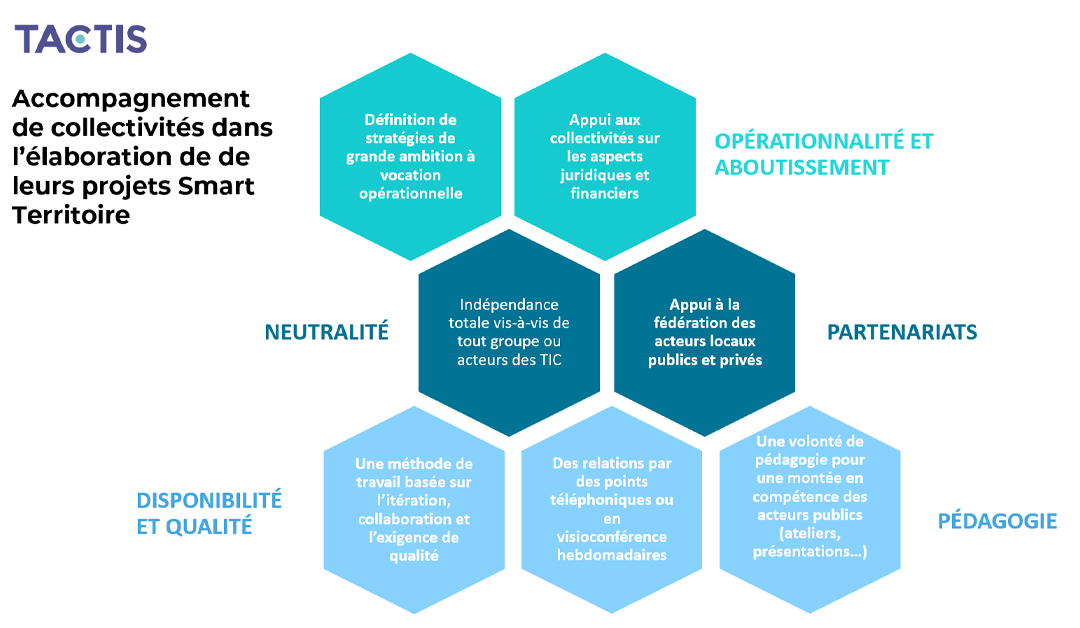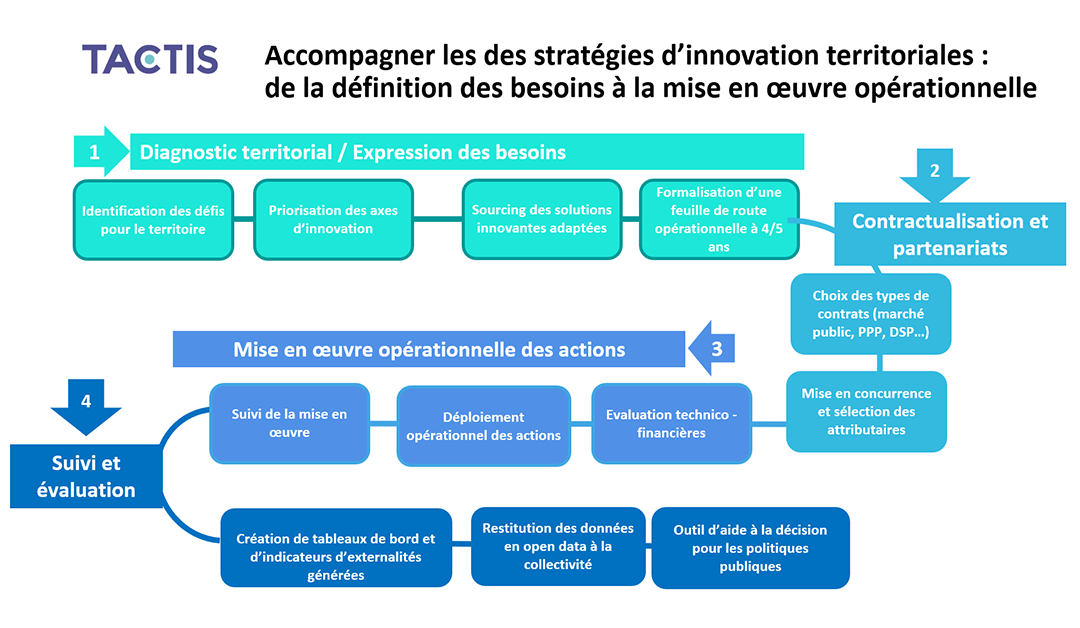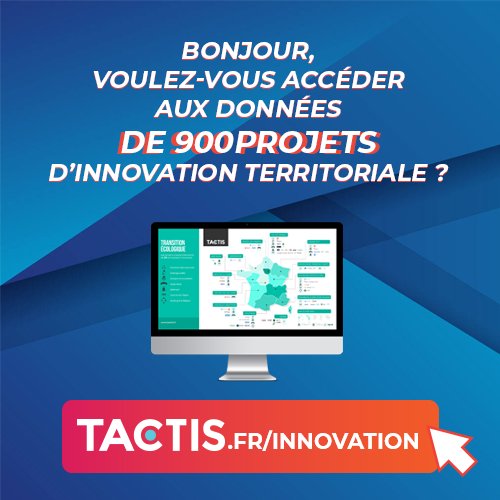Local authorities at the heart of new challenges
Local authorities are operating in a context of transformation of public action thanks to new digital tools and data, of a need for greater citizen integration in the implementation of actions, and above all, of optimization and rationalization of public spending. In this context, digital technology, whose adoption is increasingly evident among public decision-makers, constitutes a formidable tool for addressing all of these challenges in a cross-functional and efficient manner.
The implementation of territorial innovation strategies to address these challenges
To address these challenges, many local authorities are deciding to implement territorial innovation strategies: cross-functional action plans addressing clearly identified challenges (improving service offerings in the region, revitalizing city centers, leveraging the potential of data, fostering better relationships with citizens, reducing public spending through better management of business functions, etc.), which should serve as a framework for developing short- and medium-term actions to achieve an ambition to transform the region and improve the living environment of its residents.
Territorial innovation therefore aims to transform public action and its role within the region. This can involve digital technology or the definition of innovative governance principles. Indeed, for Tactis territorial innovation is not just about tools but also about principles, it is a new way of doing and thinking about the territory: innovative partnerships, multi-partner projects, long-term strategic vision, citizen involvement, etc.
Suggested articles to also read:
Prefiguring third places and community development
Building public-private partnerships for innovative projects
Tactis: Our method for supporting local authorities
To support this desire for regional transformation, Tactis supports numerous local authorities of all sizes and types (municipalities, urban communities, departments, regions, EPCI, unions, etc.) in developing innovation and territorial transformation strategies.
To do this, we have defined a method for supporting local authorities; From territorial assessment to the operational implementation of innovative actions, to the evaluation of generated externalities and territorial public policies.
1- Development of a territorial assessment:
Each territory is unique and must therefore respond to its own dynamics and challenges (renewing the attractiveness of a medium-sized city, developing digital services in a rural community, organizing soft mobility in dense metropolitan areas, etc.). Before embarking on the development of an innovation strategy, it is therefore necessary to identify the territory's realities, the needs of residents, and the dynamics of actions already underway. To this end, Tactis, in consultation with the local authority, leverages its expertise in public policy evaluation, analysis of existing offerings, and mapping territorial dynamics, focusing on meeting with both elected officials and users to define the main issues that need to be addressed.

2- Definition of priority issues:
From the territorial assessment, key issues can be identified: reducing the energy consumption of buildings, improving digital services for disadvantaged populations, uniting local ecosystems, leveraging the potential of data, revitalizing town centers, etc. These are the key issues that must be targeted by the innovation strategy.
3- Definition of strategic areas of action:
To address the issues and needs that emerged from the various analyses and consultations, the innovation strategy will focus on two or three strategic areas of action. These areas, which are the guiding principles of local public action, must be translated into operational implementation of transformative measures and actions for the region.
4- Definition of an operational action plan:
Because the ambitions of an innovation strategy can only be achieved through concrete actions, Tactis supports local authorities in defining operational "action sheets" (e.g., implementation of an urban hypervisor, development of an analysis application to support the development of cycling, creation of a multi-service platform to promote local businesses, creation of digital mediation spaces, etc.)
To define ambitious actions with an operational dimension, Tactis consultants support the local authority in:
- Framing the actions (nature of the need, scope of the action, necessary skills and partnerships)
- Their legal aspects (type of support, contractualization, legal support)
- Their economic aspects (estimating investments and operating costs, economic modeling, defining potential returns on investment)
- Access to grant and operational support mechanisms for the community
5- Structuring ambitious partnerships
Implementing an innovation strategy requires openness to various stakeholders, both local and larger: civil society, SMEs, manufacturers, startups, etc. With this in mind, Tactis helps the community define various partnerships and legal frameworks for implementing ambitious initiatives. Tactis then supports the community in the decisive stages of the partnership process: socio-economic assessment, economic modeling, financing plan, business plan, choice of structure (service concession, performance contracts, creation of a semi-public company, public innovation procurement), procedures related to contracting, etc.
6 - Monitoring, Implementation, Evaluation:
Once the innovation strategy is launched, its implementation and impact must be monitored. To this end, Tactis provides the partner community with the tools to effectively evaluate the impact of its actions: creation of dashboards and monitoring indicators, provision of Open Data, and dissemination of decision-making tools for public policies and the implementation of new initiatives.

It should be noted that, cross-functionally, the entire development of the strategy is structured and enriched around moments of consultation, sharing of results, and co-construction: presentation of actions to elected officials, partners, and residents, organization of thematic workshops, Design Thinking, in an educational effort to ensure the creation of a shared vision and the development of skills among public stakeholders, true levers for project success.
Tactis host of the co-creation workshop for #smartcity strategy of @grandparissud with the services of the agglomeration and municipalities. Thank you to the 45 participants! pic.twitter.com/EMiBAJHgn4
— @tactis (@TACTIS_group) September 11, 2019
Our expertise supports local authorities in all phases of developing innovation strategies:
Tactis, a project management assistant (PMA), supports projects from upstream consulting and design missions through to engineering and implementation management. Our multidisciplinary teams are comprised of consultants with diverse expertise:
- Technical and engineering expertise
- Project management expertise (economic and legal modeling, implementation, and monitoring)
- Public policy management expertise and its challenges (governance, scheduling issues, finance, and public accounting)
- Partnership expertise, ecosystem structuring, multi-stakeholder project development, and ambitious public-private partnerships
- Change management expertise: educational initiatives, training, support for developing the skills of public stakeholders, and organizing workshops for various audiences (elected officials, technical committees, residents, private partners, etc.)
Contact Nicolas Potier
Do you have a question about defining a territorial innovation strategy? Need clarification regarding a future project? Send an email to Nicolas Potier, Associate Director at Tactis.



